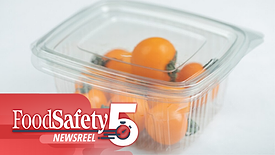Process Control
PFAS in Food Packaging: What You Need To Know
FDA's and EPA's regulation of PFAS is developing, and it is an important consideration for food producers and packagers
February 13, 2025
Never miss the latest news and trends driving the food safety industry
eNewsletter | Website | eMagazine
JOIN TODAY!Copyright ©2025. All Rights Reserved BNP Media.
Design, CMS, Hosting & Web Development :: ePublishing











